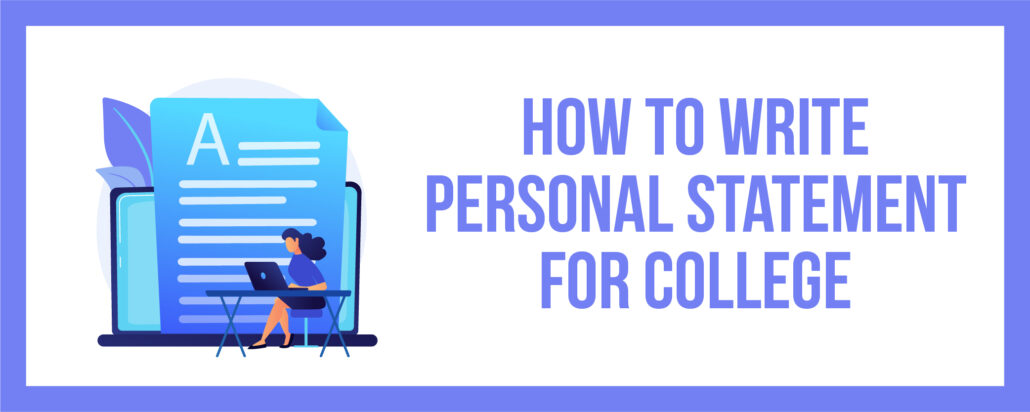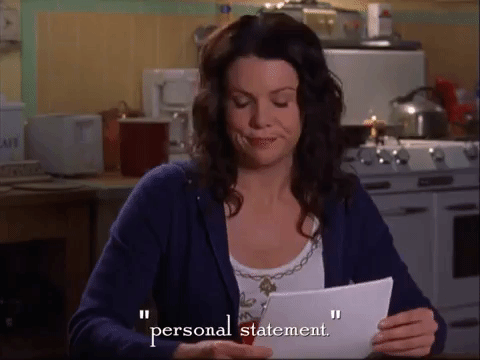
Did you know that college admissions officers spend an average of just a little over 10 minutes reading each application they receive?
This is why personal statements make such a difference when securing a university seat. With such a limited time to make an impression, writing a personal statement that effectively captures your story, personality, and aspirations is crucial.
But figuring out how to write a personal statement for college doesn’t always come naturally.
In this article, we’ll guide you through the process of writing a captivating personal statement for college, helping you stand out to admissions committees and improve your chances of acceptance.
Choosing a Topic for Your Personal Statement

Most personal statements are centered around a specific topic. When it comes to writing a personal statement essay, selecting the right topic is critical to capturing the attention of college admissions committees.
As a college applicant, you’ll want to share a story that showcases your unique experiences, passions, and values. Reflect on meaningful moments in your life, whether connected to academic interests, extracurricular activities, or personal growth. Consider what sets you apart from other applicants and how your story can contribute to the diversity of the college community.
Reflecting on Your Experiences
To create a compelling personal statement, spend some time engaging in self-reflection and self-awareness. Think about events that have shaped your life, your strengths, and even your weaknesses. Delving into your personal journey can reveal insights that college admissions officers will appreciate. Remember, they want to see not only your academic background and test scores but also the personal characteristics that make you a well-rounded individual.
Identifying Your Passions and Values
One of the most important aspects of writing personal statements is genuinely expressing your passions and values. Admissions committees want to see your intellectual interests and what drives you to pursue your goals. By discussing your passions, you’ll demonstrate your enthusiasm for your chosen field and give admissions officers a glimpse into your personality and what you’ll bring to the college environment.
Avoiding Overused or Cliché Topics
While some topics might seem appealing at first glance, they can come across as cliché or overused in the context of personal statements.
For example, writing about winning a sports game or discussing a generic volunteer experience may not be the best way to showcase your uniqueness. Instead, find a topic that highlights individuality and differentiates you from other applicants. By avoiding clichés and focusing on a distinct aspect of your life, you’ll create a compelling personal statement that resonates with the college admissions committee.
Focusing on the Structure
A well-structured personal statement is crucial for engaging your reader and effectively conveying your message. Pay close attention to the organization of your essay, ensuring that each section flows smoothly and logically into the next. This will make it easier for admissions officers to follow your story and understand the key points you’re trying to convey.
Beginning With an Engaging Introduction
Your introduction should instantly hook the reader and establish a clear theme for your personal statement. Start with a compelling anecdote, a thought-provoking question, or a powerful quote to capture the reader’s attention. This opening paragraph sets the tone for the rest of your essay and encourages admissions officers to read on.
Crafting a Compelling Body

The body of your personal statement should illustrate your experiences and growth, both personally and academically. Use detailed paragraphs to share your story, incorporating your passions, values, and intellectual interests.
Balance personal narratives with academic achievements, showing how they’ve shaped your character and contributed to your aspirations. This will help demonstrate your potential to succeed in college and beyond.
Concluding With a Memorable Ending
The conclusion of your personal statement should reinforce your theme and leave a lasting impression on the reader. Summarize your main points and discuss how your experiences have prepared you for the challenges and opportunities of college life. Demonstrating your potential and expressing your enthusiasm for the future will create a memorable and persuasive ending that resonates with admissions committees.
Showcasing Your Unique Voice
Using Your Authentic Writing Style
When writing a personal statement for college, it’s essential to use your authentic writing style. This means that your essay should feel natural and reflect your authentic voice. Avoid trying to impress the admissions committee with big words or complex sentence structures you wouldn’t usually use. Instead, focus on clearly expressing your thoughts and ideas in a way that showcases your personality and genuine writing style.
Infusing Your Personality and Values
A successful personal statement allows your personality and values to shine through. To achieve this, focus on discussing experiences, beliefs, and aspirations that have shaped who you are today. Don’t shy away from revealing your true self when sharing your story. Admissions officers are interested in getting to know you beyond your test scores and academic achievements, so be genuine and open about your personal characteristics.
Striking a Balance Between Formal and Conversational Tones
While it’s important to maintain a certain level of formality in your personal statement, you also want to engage the reader with a conversational tone. Striking this balance can be challenging but is crucial for creating a compelling essay. To achieve this, write in a manner that is both professional and approachable. Use personal pronouns, keep your sentences concise, and don’t be afraid to ask rhetorical questions or incorporate analogies and metaphors. This will help make your personal statement relatable and enjoyable to read for the admissions officers.
Making an Impact With Storytelling
Employing Vivid Descriptions
To create a captivating personal statement, use vivid descriptions that bring your experiences to life. When discussing specific events or situations, provide enough detail to help the reader visualize the scene. By painting a clear picture with your words, you’ll create an immersive experience for the admissions officers, allowing them to see your story unfold and better understand your journey.
Using Powerful Anecdotes and Examples

Incorporating powerful anecdotes and examples is an effective way to make your personal statement stand out. Share personal stories that showcase your values, passions, and growth, demonstrating how they have shaped your character and contributed to your aspirations. These anecdotes not only make your essay more engaging but also provide concrete evidence of your qualities and potential.
Engaging the Reader With a Relatable Narrative
To engage the reader and create a connection, focus on developing a relatable narrative in your personal statement. Share experiences and emotions that your audience can empathize with, allowing them to feel a genuine connection to your story. This not only makes your essay more enjoyable to read but also leaves a lasting impression on the admissions officers, increasing your chances of standing out among other applicants.
Demonstrating Your Growth and Resilience
Highlighting Your Personal and Academic Achievements
In your personal statement, take the opportunity to highlight your personal and academic achievements. Discuss milestones you’ve reached, awards you’ve received, or projects you’ve completed that have contributed to your growth. By showcasing your accomplishments, you’ll provide evidence of your dedication, hard work, and the qualities that make you a strong candidate for the college admissions process.
Addressing Challenges and Setbacks
Challenges and setbacks are inevitable in life, and discussing how you’ve overcome them can demonstrate your resilience and adaptability. Share instances where you’ve faced difficulties, and explain the lessons you’ve learned and how they’ve shaped your character. By addressing these challenges, you’ll show the admissions committee that you can grow from adversity and persevere toward your goals.
Discussing Your Future Goals and Aspirations

Your personal statement should also touch on your future goals and aspirations. Explain how your experiences have influenced your ambitions and how attending college will help you achieve them. By discussing your long-term objectives, you’ll demonstrate your motivation and commitment to pursuing your dreams, making you an attractive candidate to the admissions committee.
Discussing challenges and setbacks you’ve faced can show your determination and adaptability. Share how you’ve overcome obstacles and how these experiences have shaped your future goals and aspirations. By addressing difficulties, you’ll reveal your resilience and demonstrate your potential for success in college and beyond.
Ensuring Coherence and Flow
Organizing Your Ideas Logically
When writing your personal statement, organizing your ideas logically is essential. This means presenting your thoughts and experiences clearly and coherently. Start by outlining your essay, breaking it into sections addressing specific topics or themes. This will help you ensure that your essay flows smoothly from one point to the next, making it easier for the reader to follow your narrative and understand your message.
Creating Smooth Transitions Between Sections
Smooth transitions between sections are crucial for maintaining a coherent flow in your personal statement. Use transitional phrases or sentences that connect the two ideas as you move from one topic or experience to another. This will help guide the reader through your essay and create a seamless reading experience that keeps them engaged and interested in your story.
Maintaining a Consistent Theme Throughout
A consistent theme is vital for creating a cohesive and impactful personal statement. As you share your experiences and aspirations, ensure that each section of your essay contributes to the overall theme. This will not only make your personal statement more coherent but also help demonstrate your ability to stay focused and organized, traits that are highly valued by college admissions committees.
Mastering Grammar, Style, and Mechanics
Using Proper Grammar and Punctuation

Proper grammar and punctuation are essential when writing a personal statement for college. Admissions officers expect high-quality writing demonstrating your attention to detail and ability to communicate effectively.
Be sure to proofread your essay multiple times, checking for spelling, punctuation, and grammar errors. If you’re not a native English speaker, consider asking a trusted friend or teacher to review your work and provide feedback.
Enhancing Your Writing With Varied Sentence Structure
To create a compelling and engaging personal statement, vary your sentence structure. This means mixing shorter sentences with longer, more complex ones to create a dynamic rhythm that keeps the reader’s attention. By doing so, you’ll not only make your essay more enjoyable to read but also demonstrate your versatility and skill as a writer.
Eliminating Unnecessary Words and Phrases
In your personal statement, every word counts. To make the most of your word count, eliminate unnecessary words and phrases that don’t contribute to your overall message. Be concise and direct in your writing, focusing on the key points and experiences that best illustrate your personal growth, academic interests, and career goals. Doing this will create a more effective personal statement that gets straight to the heart of what makes you a strong college applicant.
Editing and Revising Your Personal Statement
Taking Breaks and Revisiting Your Work
When writing your personal statement for college, taking breaks and revisiting your work with fresh eyes is essential. This allows you to see your essay from a new perspective and catch any inconsistencies, errors, or areas that need improvement. Then, give yourself ample time to write, revise, and refine your personal statement so that you can submit the best possible version of your story to the admissions committee.
Utilizing Feedback From Trusted Sources

Another key part of editing and revising your personal statement is utilizing feedback from trusted sources, such as teachers, friends, or family members. Share your essay with people who know you well and can provide honest, constructive feedback. Their insights can help you identify areas for improvement, refine your message, and ensure that your personal statement effectively communicates your unique strengths and experiences.
Polishing Your Statement For Maximum Impact
After incorporating feedback and making revisions, take the time to polish your personal statement for maximum impact. This means meticulously proofreading your work, fine-tuning your word choice, and ensuring your essay is error-free. A polished personal statement will showcase your writing skills and leave a lasting impression on the admissions officers, increasing your chances of standing out among other applicants.
Personal Statement: A Few Examples
Here are two personal statement examples to give you an idea of what a personal statement essay would look like for your college application.
Personal Statement Example 1:

Throughout my life, I’ve always been captivated by the mysteries of space. It all started with a small telescope my parents gifted me on my tenth birthday. I spent countless nights gazing at the stars, yearning to unlock their secrets. My passion for astronomy was further fueled by the inspirational words of Carl Sagan, whose books and documentaries encouraged me to dream big and explore the cosmos. By pursuing a degree in astrophysics, I aim to contribute to humanity’s understanding of the universe and inspire the next generation of space enthusiasts.
During my time in high school, I sought opportunities to expand my knowledge and develop my skills in astronomy. I joined the school’s astronomy club, where I helped organize stargazing events and mentored younger students who shared my fascination with the cosmos. Additionally, I volunteered at the local planetarium, where I had the privilege of sharing my enthusiasm with visitors and learning from the experts who worked there.
I am excited about the prospect of studying astrophysics in college and continuing my journey to unravel the mysteries of the universe. My passion for astronomy and my dedication to academic excellence and community engagement make me an ideal candidate for your esteemed institution.
Personal Statement Example 2:
As the daughter of two immigrants, I witnessed the power of education in transforming lives. My parents instilled in me the importance of hard work, perseverance, and a commitment to learning. They believed that education was the key to unlocking a better future for me and our entire community. Inspired by their resilience and determination, I developed a strong interest in social justice and a desire to create positive change through education.
Throughout high school, I actively sought opportunities to help others and advocate for educational equity. For example, I volunteered as a tutor for underprivileged students, providing academic support and mentorship to help them succeed in school. I also took on leadership roles in clubs like the Model United Nations and the Student Government. In addition, I worked on initiatives to promote diversity, inclusivity, and social justice within our school community.
As I prepare to embark on my college journey, I am eager to pursue a degree in education and dedicate my career to fighting for educational equity and social justice. With its commitment to academic excellence and community engagement, I am confident that your esteemed institution will provide the ideal environment for me to grow and make a lasting impact in the world.
Get Help With From College Admissions Consultants
Frequently Asked Questions (FAQs)
A personal statement should typically be between 500 and 650 words long. This is the standard word count for most college essays, including the Common App. However, it’s crucial to adhere to the specific requirements of each college application, as some may have different word count limits or guidelines.
Yes, you can write about multiple topics in your personal statement, but it’s essential to maintain a coherent and focused narrative. Ensure that the topics are related and contribute to the overarching theme of your essay. It’s essential to balance showcasing your diverse interests and maintaining a consistent and clear message highlighting your personal growth, academic interests, and career goals.
In your personal statement, avoid including overused or cliché topics, exaggerating your accomplishments, and focusing too much on your test scores or academic record. It’s also essential to steer clear of controversial subjects or polarizing opinions that might alienate the admissions officers. Instead, showcase your unique voice, genuine experiences, and personal growth.
To ensure your personal statement stands out, tell a compelling and authentic story highlighting your unique qualities, experiences, and goals. Use vivid descriptions, powerful anecdotes, and a conversational tone to engage the reader. Ask trusted sources, such as teachers, friends, or family members, to review your essay and provide feedback on its impact and memorability. Their insights can help gauge whether your personal statement differentiates you from other applicants.
Yes. You can reuse your personal statement for multiple colleges, especially when using the Common App or other standardized application platforms. However, it’s essential to tailor your essay to each college’s specific requirements and prompts, as well as emphasize why you are a good fit for that particular institution. Double-check the application guidelines and modify your personal statement accordingly to ensure it addresses the unique aspects of each college’s admissions process.
When writing personal statements for graduate or law school applications, it’s crucial to tailor your essay to the specific program you’re applying to. Research the institution and its values, and demonstrate how your academic interests, career goals, and experiences align with the program. Be sure to highlight any relevant skills or accomplishments that showcase your ability to succeed in a rigorous academic environment. Finally, maintain a professional tone and focus on your passion for the subject, your commitment to your field, and your motivation for pursuing an advanced degree.
While the terms “college essay” and “personal statement” are often used interchangeably, they can have subtle differences. For example, a personal statement typically refers to an essay required as part of the college application process, where students share their personal experiences, goals, and values. A college essay, on the other hand, might refer to any essay written during one’s college years. However, in the context of college admissions, both terms generally refer to the same type of essay, which aims to help admissions officials understand the applicant on a deeper, more personal level.
To avoid common mistakes when writing your personal statement, plan and outline your essay before you begin. This will help ensure a coherent structure and a focused narrative. Second, be genuine and use your own voice, avoiding clichés and overused phrases. Third, proofread your essay multiple times and ask for feedback from trusted sources to identify and correct any grammar, punctuation, or stylistic errors. Lastly, ensure that your essay effectively showcases your personal growth, experiences, and aspirations while demonstrating how you would be a valuable addition to the college community.
Yes. Incorporating examples from your life is an excellent way to make your personal statement engaging and memorable. Personal anecdotes and experiences can help demonstrate your growth, resilience, and character while showcasing your unique voice. When selecting examples, focus on those relevant to your overarching theme, and ensure they highlight your personal qualities and achievements. Be honest and authentic, and use vivid descriptions and powerful anecdotes to bring your story to life.
The best personal statement is tailored to you and the school. While you can reuse your personal statement for multiple colleges, it’s essential to customize your essay for each institution. Research each college’s values, programs, and expectations, and ensure your personal statement addresses any specific prompts or requirements they may have. Tailoring your essay to each college demonstrates your genuine interest in the institution and helps convey how you would be a good fit for their community.
Yes, college admissions consultants can provide valuable assistance when crafting your personal statement. These consultants are experienced professionals who understand the college application process and what admissions committees are looking for in a compelling essay. In addition, they can help you identify your strengths, brainstorm ideas, develop a strong narrative, and refine your writing.
Bryce Welker is an active speaker, blogger, and regular contributor to Forbes, Inc.com, and Business.com where he shares his knowledge to help others boost their careers. Bryce is the founder of more than 20 test prep websites that help students and professionals pass their certification exams.












